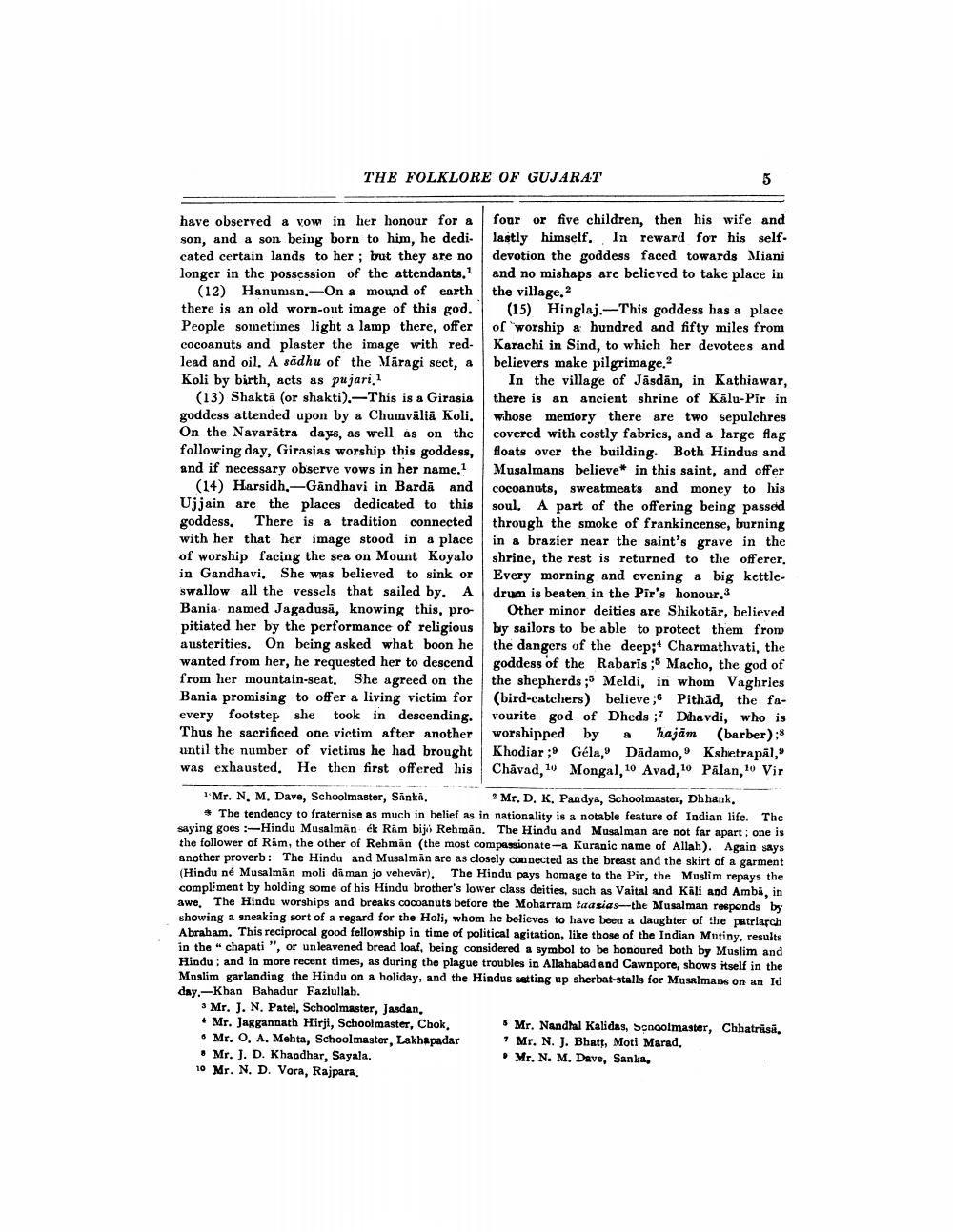________________
THE FOLKLORE OF GUJARAT
have observed a vow in her honour for a son, and a son being born to him, he dedi- cated certain lands to her ; but they are no longer in the possession of the attendants,
(12) Hanuman.-On a mound of earth there is an old worn-out image of this god. People sometimes light a lamp there, offer cocoanuts and plaster the image with red. lead and oil. A sadhu of the Maragi sect, a Koli by birth, acts as pujari,
(13) Shakta (or shakti).This is a Girasia goddess attended upon by a Chumväliä Koli. On the Navaratra days, as well as on the following day, Girasias worship this goddess, and if necessary observe vows in her name.
(14) Harsidh.-Gāndhavi in Barda and Ujjain are the places dedicated to this goddess. There is a tradition connected with her that her image stood in a place of worship facing the sea on Mount Koyalo in Gandhavi. She was believed to sink or swallow all the vessels that sailed by. A Bania named Jagadusā, knowing this, pro pitiated her by the performance of religious austerities. On being asked what boon he wanted from her, he requested her to descend from her mountain-seat. She agreed on the Bania promising to offer a living victim for every footstep she took in descending. Thus he sacrificed one victim after another until the number of victims he had brought was exhausted. He then first offered his
four or five children, then his wife and lastly himself. In reward for his selfdevotion the goddess faced towards Miani and no mishaps are believed to take place in the village,
(15) Hinglaj.-This goddess has a place of worship a hundred and fifty miles from Karachi in Sind, to which her devotees and believers make pilgrimage.?
In the village of Jäsdān, in Kathiawar, there is an ancient shrine of Kälu-Pir in whose memory there are two sepulchres covered with costly fabrics, and a large flag floats over the building. Both Hindus and Musalmans believe* in this saint, and offer cocoanuts, sweatmeats and money to his soul. A part of the offering being passed through the smoke of frankincense, burning in a brazier near the saint's grave in the shrine, the rest is returned to the offerer. Every morning and evening a big kettledrum is beaten in the Pir's honour,
Other minor deities are Shikotär, believed by sailors to be able to protect them from the dangers of the deep;* Charmathvati, the goddess of the Rabaris ;5 Macho, the god of the shepherds ;5 Meldi, in whom Vaghries (bird-catchers) believe;& Pithad, the favourite god of Dheds ;? Dhavdi, who is worshipped by a hajām (barber); Khodiar;° Géla, Dadamo, Kshetrapal," Chāvad, 10 Mongal, 10 Avad, 10 Palan, 1. Vir
Mr. N. M. Dave, Schoolmaster, Sanka.
Mr. D, K. Pandya, Schoolmaster, Dhhank, The tendency to fraternise as much in belief as in nationality is a notable feature of Indian life. The saying goes - Hindu Musalman ék Ram biji Rehman. The Hindu and Musalman are not far apart: one is the follower of Rám, the other of Rehman (the most compassionate-a Kuranic name of Allah). Again says another proverb: The Hindu and Musalman are as closely connected as the breast and the skirt of a garment (Hindu né Musalman moli di man jo vehevar). The Hindu pays homage to the Pir, the Muslim repays the compliment by holding some of his Hindu brother's lower class deities, such as Vaital and Kali and Amba, in awe. The Hindu worships and breaks cocoanuts before the Moharram taasias--the Musalman responds by showing a sneaking sort of a regard for the Holi, whom he believes to have been a daughter of the patriarch Abraham. This reciprocal good fellowship in time of political agitation, like those of the Indian Mutiny, results in the " chapati", or unleavened bread loaf, being considered a symbol to be honoured both by Muslim and Hindu , and in more recent times, as during the plague troubles in Allahabad and Cawnpore, shows itself in the Muslim garlanding the Hindu on a holiday, and the Hindus setting up sherbat-stalls for Musalmans on an Id day.-Khan Bahadur Fazlullah.
* Mr. J. N. Patel, Schoolmaster, Jasdan, • Mr. Jargannath Hirji, Schoolmaster, Chok. * Mr. Nandhal Kalidas, Scooolmaster, Chhatrasa, . Mr. O, A. Mehta, Schoolmaster, Lakhapadar Mr. N. J. Bhatt, Moti Marad, • Mr. J. D. Khandhar, Sayala.
. Mr. N. M. Dave, Sanka, 10 Mr. N. D. Vora, Rajpara.




